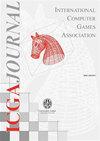蒙特卡罗的新用途
IF 0.2
4区 计算机科学
Q4 COMPUTER SCIENCE, SOFTWARE ENGINEERING
引用次数: 0
摘要
一些RYBKA软件中“蒙特卡罗”功能的起源与Kaufman(2010)中描述的匹配有关,这可能是一件有趣的事情。在加入RYBKA团队后不久,我想改进使用的基本块值,因为它们在我看来严重偏离了基础。我的想法是,如果我可以从各种材料不平衡的位置开始玩数千个超高速电脑游戏,我就可以从结果中判断评估函数是否对这些位置进行了错误评分。我问瓦斯·拉杰里希是否可以为我制作一个RYBKA版本,使这成为可能,他答应了。严格地说,它不是真正的“随机”或“蒙特卡洛”,因为它的设计从来没有重复过一场比赛,但细节在这里并不重要。我只想说,对于我来说,这是一种有效的随机设置,以便在不降低游戏水平的情况下确保游戏的多样性。本文章由计算机程序翻译,如有差异,请以英文原文为准。
A New Use for Monte Carlo
It may be interesting to communicate that the origin of the “Monte-Carlo” feature in some RYBKA software had something to do with the matches described in Kaufman (2010). Shortly after joining the RYBKA team, I wanted to refine the basic piece values used, as they seemed to me seriously off-base. I had the idea that if I could play thousands of hyperspeed computer games starting from positions with various material imbalances, I could judge from the results whether the evaluation function was mis-scoring those positions. I asked Vas Rajlich if he could make a RYBKA version for me that would make this possible, and he did so. Strictly speaking it was not truly “random” or “Monte-Carlo” as it was designed never to repeat a game, but the details are not important here. Suffice it to say that for my purpose it was effectively sufficiently random so as to insure plenty of variety in the games without degrading the level of play too much.
求助全文
通过发布文献求助,成功后即可免费获取论文全文。
去求助
来源期刊

Icga Journal
工程技术-计算机:软件工程
自引率
25.00%
发文量
16
期刊介绍:
The ICGA Journal provides an international forum for computer games researchers presenting new results on ongoing work. The editors invite contributors to submit papers on all aspects of research related to computers and games. Relevant topics include, but are not limited to:
(1) the current state of game-playing programs for classic and modern board and card games
(2) the current state of virtual, casual and video games
(3) new theoretical developments in game-related research, and
(4) general scientific contributions produced by the study of games.
Also welcome is research on topics such as:
(5) social aspects of computer games
(6) cognitive research of how humans play games
(7) capture and analysis of game data, and
(8) issues related to networked games are invited to submit their contributions.
 求助内容:
求助内容: 应助结果提醒方式:
应助结果提醒方式:


